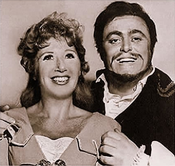
05 Jul 2007
BELLINI: I puritani
I puritani, opera seria in three acts
Music composed by Vincenzo Bellini (1801-1835). Libretto by Carlo Pepoli from Têtes rondes et Cavaliers (1833) by Jacques Ancelot and Xavier Saintine.
Andromaca: Dramma per musica in three acts.
Ermione: Azione tragica in two acts.
Ippolito ed Aricia: Tragedia in five acts.
Idomeneo: Opera seria in three acts.
Paride ed Elena: Dramma per musica in five acts.
Orphée: Opera in four acts.
Music composed by Christoph Willibald Gluck (arranged by Hector Berlioz, 1859). Libretto by Ranieri de' Calzabigi
Alceste, ou Le triomphe d’Alcide: Tragédie en musique in a prologue and five acts.
Alceste: Tragédie opéra in three acts.
Medea: Melodramma tragico in three acts.
Oedipe à Colone: Tragédie lyrique in three acts.
Elektra: Tragedy in one act.
Fedra: Dramma per musica in two acts.
Les Troyens: Grand opéra in five acts.
Die Meistersinger von Nürnberg: Music drama in three acts.
Ariadne auf Naxos, Oper with a prologue and one act. Music composed by Richard Strauss. Libretto by Hugo von Hofmannsthal.
Der Schauspieldirektor [The Impresario], Singspiel in one act, K486.
Divertimento teatrale in one act.
Andrea Chénier, an opera in four acts.
La figlia del reggimento [La Fille du régiment (‘The Daughter of the Regiment’)], Opéra comique in two acts.
L’elisir d’amore, Melodramma giocoso in two acts.

I puritani, opera seria in three acts
Music composed by Vincenzo Bellini (1801-1835). Libretto by Carlo Pepoli from Têtes rondes et Cavaliers (1833) by Jacques Ancelot and Xavier Saintine.
First Performance: 24 January 1835 at Théâtre Italien, Paris.
Principal Characters:
| Lord Gualtiero Walton Governor General of the fortress | Bass |
| Sir Giorgio brother of Lord Walton, retired Puritan colonel | Bass |
| Lord Arturo Talbo Cavalier, Stuart sympathizer | Tenor |
| Sir Riccardo Forth Puritan colonel | Baritone |
| Sir Bruno Robertson Puritan officer | Tenor |
| Enrichetta di Francia [Queen Henrietta Maria] widow of Charles I | Mezzo-Soprano |
| Elvira daughter of Lord Walton | Soprano |
Time and Place: Near Plymouth, England, during the Second English Civil War after the execution of Charles I (30 January 1649)
Synopsis:
Act One
Riccardo, a follower of Cromwell and his Puritans, and Arturo, a staunch Cavalier who supports the Stuart cause, are both in love with Elvira, the daughter of Lord Walton. Walton had originally promised Riccardo his daughter’s hand in marriage but subsequently relented, not wishing to disregard the feelings of his daughter, who is in love with Arturo. The preparations for the nuptuals of Elvira and Arturo are in full swing.
Elvira as yet knows nothing of her good fortune. Her uncle, Giorgio, informs her that he has interceded on her behalf with his brother, her father, who has now agreed to her marrying Arturo.
Arturo arrives for the festivities. On discovering that a prisoner in the fortress under sentence of death is, in fact, Queen Enrichetta, the widow of Charles I of England, he enables her to escape by disguising her in Elvira's bridal veil. Elvira interprets this as desertion and loses her reason.
Act Two
The English parliament has sentenced Arturo to death, and Elvira no longer sees any sense in her life.
Giorgio hopes that a sudden piece of good news will cure Elvira and restore her to reason, and what better news than that Aturo should be pardoned. Giorgio persuades Riccardo to spare Arturo, if the latter does not fight on the side of the Royalists in Cromwell's impending battle against the Cavalier followers of the Stuarts.
Act Three
Arturo has returned to the fortress secretly to seek out Elvira and convince her of his continued devotion. Cromwell's soldiers apprehend him and threaten him with execution. At this very moment Elvira suddenly becomes aware of the situation and pleads, in vain, for Arturo's life. At the very last moment a messenger arrives with the news of Cromwell’s defeat of the Stuart followers. Cromwell has issued a pardon for all prisoners. Arturo is freed and there is now nothing to prevent the lovers from marrying.
[Synopsis: Bayerische Staatsoper (translation: Susan Bollinger)]